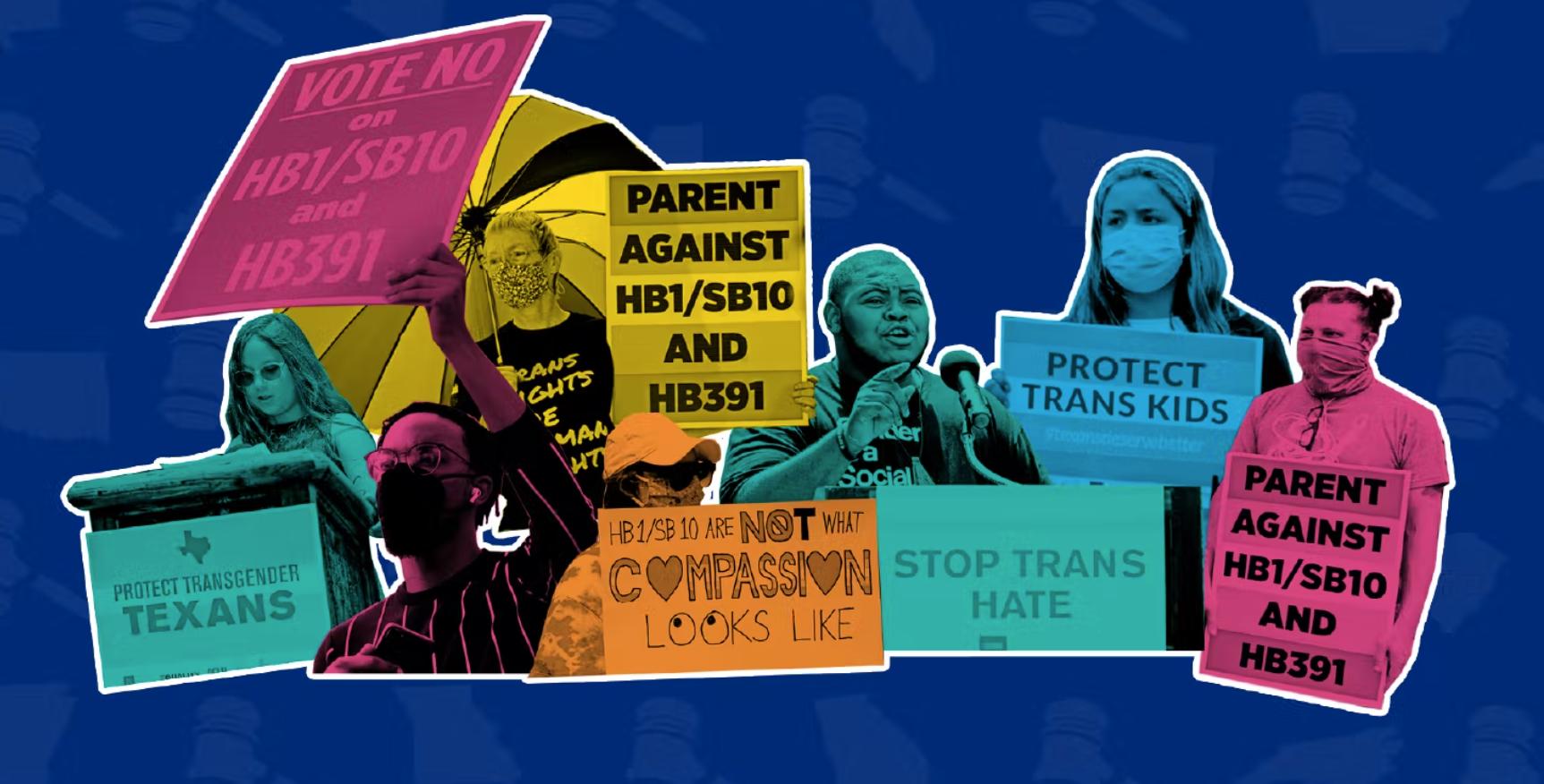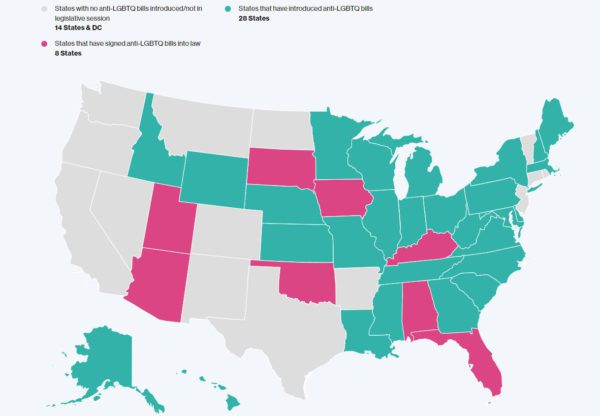Politics
Overview of over 300 anti-LGBTQ+ bills in 2022
As Republican politicians continue to push for limits to LGBTQ+ rights, many LGBTQ+ people & their allies promise to continue fighting

In May 2021, the Human Rights Campaign (HRC) officially announced the worst year for anti-LGBTQ+ legislation in recent history. At the time, state lawmakers introduced over 250 bills – from anti-Trans sports legislation to religious refusal measures – in statehouses across the country, 17 of which were enacted into law.
Now, LGBTQ+ rights in states seem to be taking even more of a hit. According to HRC, over 300 anti-LGBTQ+ bills have surfaced in 36 Legislatures. As the legislation increases – 41 such measures were introduced in 2018 – so does the number of bills passed and enshrined into state law, though LGBTQ+ advocates often challenge the laws in court.
The legislation overwhelmingly targets Trans youth, according to the organization, from blocking participation in sports to baring access to gender-affirming care. Lawmakers have also attempted, and in some cases passed, legislation limiting how LGBTQ+ issues can be taught in schools and keeping Trans kids from using restrooms that correspond with their gender identity.
“2022 is on track to surpass last year’s record number of anti-transgender bills,” Cathryn Oakley, state legislative director and senior counsel at the HRC, told the Blade, calling the “legislative attacks” on Trans youth “craven, baseless, and an effort to create more division, fearmonger, and rile up radical right-wing voters at the expense of innocent kids.”
Proponents of the bills say they are to “protect” parental rights, children and religious freedom. However, LGBTQ+ advocates and people continue to denounce the legislation as discriminatory and harmful.
This year, one of the most talked-about anti-LGBTQ+ measures was Florida’s so-called “Don’t Say Gay” bill, which Republican Gov. Ron DeSantis signed into law last month. The legislation will ban classroom instruction about sexual orientation and gender identity in grades K-3 if it survives legal challenges.
Days after DeSantis signed the bill, the first lawsuit against the measure emerged, arguing the statute “would deny to an entire generation that LGBTQ people exist and have equal dignity.”
“This effort to control young minds through state censorship —and to demean LGBTQ lives by denying their reality — is a grave abuse of power,” the lawsuit says.
Since Republican sponsors successfully pushed the bill through, other states have followed in Florida’s footsteps. Ohio, for example, introduced its version of the legislation roughly a week after DeSantis’ signature.
In Alabama, Republican Gov. Kay Ivey signed an anti-Trans bathroom bill with a last-minute amendment to keep educators from discussing gender identity and sexual orientation in grades K-5. Ivey didn’t stop there, also signing a bill that would ban gender-affirming care for minors.
Like Florida, LGBTQ+ advocates were quick to announce legal challenges to the legislation. Some of the most prominent LGBTQ+ and civil rights organizations – including the HRC, GLAD and Southern Poverty Law Center (SPLC) – announced a legal challenge in federal court against Alabama’s gender-affirming care ban.
In terms of legislation introduced, Tennessee has far outpaced other states, according to LGBTQ+ rights organization Freedom for All Americans. The group’s legislative tracker found over 30 bills limiting LGBTQ+ rights in the state – including a “Don’t Say Gay” bill and a ban on LGBTQ-themed literature in schools. But, unlike other Republican-controlled states, none have made it out of the statehouse.
Arizona has also been a hotspot for anti-LGBTQ+ legislation, with at least 17 bills, according to Freedom for All Americans. In March, Republican Gov. Doug Ducey signed two bills limiting the rights of Trans people in the state – one banning some types of medical care for Trans youth, and the other preventing Trans students from participating in school sports consistent with their gender identity.
“Across the country, moderate Republicans are struggling—and too often failing—to stop the takeover of their party by dangerous extremists,” Shannon Minter, legal director for the National Center for Lesbian Rights (NCLR), told the Blade at the time, adding: “We are in danger of watching large segments of our nation give way to authoritarian extremism.”
In other states, anti-LGBTQ+ legislation became law without support from its governor – Democratic or Republican. In fact, two Republican governors vetoed anti-Trans sports bills in late March.

Utah Gov. Spencer Cox and Indiana Gov. Eric Holcomb, both Republicans, vetoed legislation that barred Trans youth from participating in sports. Cox said the bill had “several fundamental flaws and should be reconsidered,” while Holcomb said the measure was in search of a problem.
In the end, however, the Utah House overturned Cox’s veto days later. Holcomb’s veto still stands.
“This [Utah] bill focuses on a problem of ‘fairness’ in school sports that simply does not exist — but its negative impacts on the mental health and well-being of trans and nonbinary youth are very real,” said Sam Ames, director of advocacy and government affairs at The Trevor Project. “These youth already face disproportionate rates of bullying, depression, and suicide risk, and bills like this one will only make matters worse.”
In recent weeks, two Democratic governors vetoed anti-LGBTQ+ legislation from their Republican-controlled legislatures.
Kentucky Democratic Gov. Andy Beshear vetoed legislation that would ban Trans girls from playing on sports teams in Kentucky schools that match their gender identities from sixth grade through college. GOP lawmakers quickly overturned the decision.
“Shame on the Kentucky General Assembly for attacking trans kids today,” said Chris Hartman, executive director for the Fairness Campaign. Shame on our commonwealth’s lawmakers for passing the first explicitly anti-LGBTQ law in Kentucky in almost a decade.”
Kansas Democratic Gov. Laura Kelly vetoed last weekend two anti-LGBTQ+ measures, the “Parents’ Bill of Rights” and the “Fairness in Women’s Sports” Acts.
GOP lawmakers in Idaho decided last month to effectively kill a bill criminalizing gender-affirming care, one of the most extreme proposals in the country. It would have made it a felony — punishable by up to life in prison — to provide minors with hormones, puberty blockers or gender-affirming surgery.
In a statement, Idaho Senate Republicans said they “stongly” oppose “any and all gender reassignment and surgical manipulation of the natural sex” on minors. But they also wrote that the controversial legislation “undermines” a parent’s right to make medical decisions for their children.
“We believe in parents’ rights and that the best decisions regarding medical treatment options for children are made by parents, with the benefit of their physician’s advice and expertise,” the senators wrote.
Texas is one of the 14 states with no anti-LGBTQ+ legislation, as the state only holds legislative sessions in odd years. However, the Lone Star State has made headlines for anti-Trans orders from Republican Gov. Greg Abbott.
Abbott, in February, directed the Texas Department of Family and Protective Services (DFPS) to investigate reports of gender-affirming care on minors as “child abuse.” The order followed an official opinion from state Attorney General Ken Paxton that called the treatment a form of “child abuse” under Texas law.
Since, two Texas judges have ruled against the policy – one in district court and the other after an appeal. Still, Paxton vows to keep fighting for the order in court.
But even as Republican politicians continue to push for limits to LGBTQ+ rights, many LGBTQ+ advocates, people and allies promise to continue fighting against the discriminatory efforts – whether in court or on the streets.
“The Human Rights Campaign strongly condemns these harmful, potentially life-threatening bills and will continue to use every tool at our disposal to fight for the rights of transgender youth and all LGBTQ+ people,” Oakley said.
In a January 2022 poll by The Trevor Project, an organization that provides crisis intervention and suicide prevention services to LGBTQ youth under 25, and Morning Consult, over two-thirds of LGBTQ youth said recent debates over state laws that target transgender people have negatively impacted their mental health.
“These results underscore how recent politics and ongoing crises facing the globe can have a real, negative impact on LGBTQ young people, a group consistently found to be at significantly increased risk for depression, anxiety and attempting suicide because of how they are mistreated and stigmatized in society,” Amit Paley, CEO of The Trevor Project, said in a statement.
Politics
Trump’s battle with Maine over trans policies escalates
State has filed a lawsuit, federal government has cut funding and launched investigations

A months-long standoff between between President Donald Trump and Maine Gov. Janet Mills (D) continued to escalate this week with a lawsuit targeting the administration on Monday and cuts to federal grants to the state on Tuesday.
The conflict kicked off on Feb. 21 at the White House, where the president threatened Mills with retaliation after she declined to say that her state would not comply with his executive order barring transgender athletes from competing in school sports. The governor and other officials have said the policy is in conflict with provisions of the Maine Human Rights Act, while the president argued his executive action supersedes state law.
While the heated exchange between the two concluded with each party vowing to see the other in court, developments in the time since suggest that Trump and Mills are likely to square off over legal questions far broader than whether the White House can prohibit trans girls in a blue state from joining the field hockey team.
In a complaint filed on Monday, Maine Attorney General Aaron Frey argued U.S. Department of Agriculture Secretary Brooke Rollins had unlawfully frozen funding for “certain administrative and technological functions” in schools in his state after concluding, in the absence of a formal investigation, that some of their programs violated Title IX rules. A letter last week from Rollins notifying Mills of the USDA’s decision warned that it was “only the beginning.”
Then on Tuesday, the Maine Department of Corrections said the Justice Department had cancelled several grants, which according to the Maine Morning Star would have supported “drug treatment for adults in reentry, programs that foster engagement between incarcerated parents and their children, and resources for corrections agencies to improve post-release supervision in order to prevent recidivism and reduce crime.” U.S. Attorney General Pam Bondi said during an interview that the move came in response to the state’s incarceration of a transwoman in a women’s prison.
One of Trump’s day-one executive actions targeting trans rights included a provision directing the AG and the Homeland Security secretary to ensure that women’s prisons and detention centers do not detain or house “males” or trans women, though here and elsewhere the administration deliberately does not make the distinction — and in Section 2 of the order, establishes that the policy of the federal government will be to treat gender as a binary that is fixed at birth, a narrow definition that denies the biological reality that people can be intersex (meaning their sex characteristics cannot be clearly distinguished as male or female) while others, like trans individuals, may experience incongruity between their gender and birth sex.
Leading up to this week, other major developments following the Feb. 21 White House confrontation between Trump and Maine’s Democratic governor include:
- A probe in late March by the U.S. Department of Education into whether policies in Maine schools that protect the privacy of students by prohibiting disclosures to parents about the sexual orientation or gender identity of their kids may violate federal law,
- Trump’s demand for an apology from Mills on her refusal to do so, both in late March,
- DOE’s determination in late March that schools in the state were violating Title IX by allowing trans women and girls to compete in sports, which came after the Trump administration reversed that portion of the Title IX guidance issued under former President Joe Biden,
- An announcement in mid-March by the the U.S. Department of Health and Human Services Office for Civil Rights that the Maine Principals’ Association and Greely High School violated Title IX by allowing trans athletes to compete in sports,
- The USDA’s decision in early March to hold up funding for universities in the University of Maine system pending the conclusion of the agency’s probe into possible violations of Title IX and Title VI, which was subsequently reinstated after a couple of weeks,
- The National Oceanic and Atmospheric Administration’s withdrawal of funding in early March for the University of Maine’s Maine Sea Grant program, which was followed less than a week later with the U.S. Department of Commerce ‘s announcement that it would be renegotiated, and
- HHS’s determination in late February that the Maine Department of Education violated Title IX, a conclusion reached just four days after an investigation was opened and without any interviews, data requests or negotiations.
Congress
Chris Pappas launches Senate bid in N.H.
Video references ‘political extremists who want to take rights away’

Gay U.S. Rep. Chris Pappas (D-N.H.) launched his bid for the seat held by retiring U.S. Sen. Jeanne Shaheen (D-N.H.) with a video posted to X Thursday morning and kickoff event planned for the evening in his hometown of Manchester, N.H.
“I’m running for Senate because our economy, our democracy, and our way of life are on the line, and New Hampshire deserves a senator who is grounded in the people, places, and values of this state,” he said in a press release. “Granite Staters know my record of taking on the big fights and looking out for them — pushing tax cuts for working families and small businesses, taking on predatory companies and corporate polluters, and standing up to Big Pharma to lower drug costs.”
Pappas’s statement continued, “Like Sen. Shaheen, I’ll always put New Hampshire first. You can count on me to lead the charge to confront this administration, self-dealing billionaires, and extreme politicians who threaten our future and our ability to get things done for New Hampshire.”
In his video, the fourth-term congressman pledged to rein in the power of big corporations, and he addressed “veterans, parents, small business owners,” and the “people who have done everything right” but are “asking ‘why does it feel like the system is rigged?'”
Referencing concerns with the Republican administration and GOP majorities in Congress, he said, “You think about the social security office that’s gonna be closed in Littleton, drastic cuts to Medicaid, all in the name of giving big tax breaks to billionaires like Elon Musk.”
Pappas also seemed to allude to anti-LGBTQ moves by the White House and congressional Republicans, promising to stand up to “political extremists who want to take rights away.” The ad wrapped with a shot of the congressman with his husband Vann Bentley. “We will get our country back on track. Stronger, fairer, freer, working for everyone.”
I’m in.
— Chris Pappas (@ChrisPappasNH) April 3, 2025
Today I’m announcing my campaign for U.S. Senate because New Hampshire needs a fighter who gets things done.
Let’s do this. pic.twitter.com/bAyE5u4LSk
Freshman U.S. Rep. Maggie Goodlander (D-N.H.) is also considering a run for Shaheen’s seat while former U.S. Sen. Scott Brown (R-Mass.) and former New Hampshire Gov. Chris Sununu are mulling campaigns.
Pappas was endorsed by the LGBTQ Victory Fund, whose newly seated CEO Evan Low released a statement:
“Rep. Chris Pappas has a long and storied history of serving New Hampshire, and LGBTQ+ Victory Fund has been right by his side since he ran for state office 23 years ago. He has a track record of taking on big fights for his constituents and has proven that he can win tough races, outperform expectations, and flip key Granite State seats. Whether its strengthening the economy, protecting bodily autonomy or taking on price gougers, Chris will continue to be an important voice that looks out for the people of New Hampshire.
“We need Chris’s pro-equality voice in the Senate, where right now we only have one LGBTQ+ member. He will be a strong fighter against anti-equality forces in the current administration and extreme politicians looking to erase our rights and existence.
“His presence in the Senate will be critical to retake the majority and ensure that Granite State voters won’t get a raw deal. Chris deeply understands New Hampshire, and his record shows that he is laser-focused on getting things done. We are thrilled to endorse Chris Pappas for a history-making place as the first out LGBTQ+ man to serve in the Senate.”
Congress
Chris Pappas reportedly planning run for US Senate
Gay N.H. lawmaker has not officially announced bid

Gay U.S. Rep. Chris Pappas (D-N.H.) has told colleagues he plans to run for New Hampshire’s open U.S. Senate seat, to succeed retiring Democratic U.S. Sen. Jeanne Shaheen, according to a report in Axios on Thursday.
“I haven’t come to a decision yet,” he said during a town hall over the weekend. “But I know these times are incredibly perilous, and this is a time where we need the kind of leadership that Sen. Shaheen has demonstrated, which is about putting the needs of New Hampshire first.”
Axios also reported that fellow Democratic U.S. Rep. Maggie Goodlander, who represents the Granite State’s 2nd Congressional District and previously served as deputy assistant attorney general in the Justice Department’s Antitrust Division, is considering a run.
Hundreds of constituents attended recent town halls hosted by Pappas and Goodlander.
While Pappas’s voting record positions him as among the most centrist and bipartisan of the House Democrats, the National Republican Senatorial Committee has sought to portray the lawmaker as a far-left ideologue in a new oppo website.
If he runs and is elected to succeed Shaheen, Pappas would be one of two openly LGBTQ U.S. senators, alongside Tammy Baldwin (D-Wis.).

















